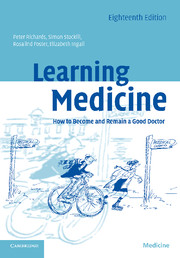Book contents
- Frontmatter
- Contents
- Foreword
- Preface
- 1 Why medicine and why not?
- 2 Opportunity and reality
- 3 Requirements for entry
- 4 Choosing a medical school
- 5 Application and selection
- 6 Interviews
- 7 Medical school: the early years
- 8 Medical school: the later years
- 9 Doubts
- 10 The new doctor
- 11 Developing your career
- 12 Career opportunities
- 13 Privileges and responsibilities: avoiding the pitfalls
- Postscript
- Appendices
- Index
7 - Medical school: the early years
Published online by Cambridge University Press: 02 December 2009
- Frontmatter
- Contents
- Foreword
- Preface
- 1 Why medicine and why not?
- 2 Opportunity and reality
- 3 Requirements for entry
- 4 Choosing a medical school
- 5 Application and selection
- 6 Interviews
- 7 Medical school: the early years
- 8 Medical school: the later years
- 9 Doubts
- 10 The new doctor
- 11 Developing your career
- 12 Career opportunities
- 13 Privileges and responsibilities: avoiding the pitfalls
- Postscript
- Appendices
- Index
Summary
The first few weeks at medical school are bewildering. On top of all the upheaval of finding your feet in a new place, finding new friends, finding the supermarket, and finding that your bed does not miraculously make itself, you will find yourself at the beginning of a course that will mould the rest of your life. Ahead there are new subjects to study, a whole new language to learn, a new approach to seeing problems, new experiences and challenges, thrills and spills, ups and downs, laughter and tears.You are now at university, you are a medical student and you are on your way to being a doctor.
Until recently the undergraduate medical course had remained largely unaltered for decades, having slowly and steadily evolved over centuries of medical learning. All that has had to change in the past decade as the structure of the traditional course came face to face with the strains of modern medicine. The explosion of scientific knowledge, the unstoppable advances in technology, the ever-developing complexity of clinical practice, and changing health-care provision have all added to the tremendous demands on tomorrow's doctors.
At the same time there has been a reaction against the soaring dominance of modern science over old-fashioned art in medicine, technical capability over wise restraint, and process over humanity. A growing concern (not necessarily justified) that preoccupation with the diagnostic and therapeutic potential of molecular biology will obscure the patient as a whole person, a person who so often simply does not feel well for relatively trivial and unscientific reasons, and probably only needs to be listened to and encouraged to take responsibility for his or her own health.
- Type
- Chapter
- Information
- Learning MedicineHow to Become and Remain a Good Doctor, pp. 83 - 100Publisher: Cambridge University PressPrint publication year: 2007

